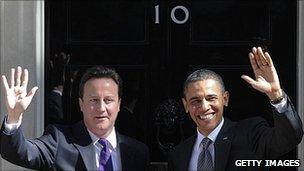Obama visit to UK: Leaders admit deficit differences
- Published

Mr Cameron defended his plan to cut the deficit and said he and President Obama agreed on much
Barack Obama and David Cameron have acknowledged differences in how they plan to cut their deficits but argued their economic goals remain the same.
The US President said the pace at which the countries cut spending may vary due to their different circumstances.
He urged a "balanced approach" to securing recovery, with both targeted investment and austerity measures.
The prime minister said the UK was right to prioritise the deficit and UK-US plans were "relatively similar".
The two leaders were asked about their respective economic strategies at a press conference on the second day of the President's state visit to the UK.
President Obama said concerted action by the US, UK and other countries in 2009 and 2010 had helped to "yank the global economy out of recession".
But the world's leading powers now faced the "other challenge" of how to secure sustainable growth, higher employment and living standards for their citizens, he argued.
'Responsible growth'
"How do we sustain growth in a way which is responsible and responsive to the needs of our people?
That requires us to continue to make investments in education, science, technology and infrastructure - things that help our economies grow. But that also means governments that live within their means."
Levels of borrowing, patterns of employment and external financial pressures were not the same in any two countries, he argued, and countries' approaches would necessarily be different.
"As a consequence, the sequencing or pace may end up being different," he said.
"But one thing I am absolutely clear about. David (Cameron) and I want to arrive at the same point - a point at which we are making sure that are governments are doing what they need to do to ensure broad-based prosperity but doing so in a responsible way that does not mortgage our futures and leave a mountain of debt to future generations."
'Constant process'
Governments would need to be flexible in their thinking in response to events, he suggested, and that programmes which were not working should be dropped in favour of other initiatives.
"The other point I think David (Cameron) and I would agree on is this is going to be a constant process of trying things and making adjustments," he added.
"It means we have to make sure we take a balanced approach that is a mixture of cuts but also thinking how we generate revenues so that there is a match between money coming out and money coming in."
President Obama reiterated this message in a speech later to MPs and peers in the Palace of Westminster, saying there would be "different paths for both of our countries" in dealing with their debts.
David Cameron's coalition government has dismissed suggestions it must draw up a "plan B" to its goal of eliminating the structural deficit within four years in the face of Labour claims that aggressive spending cuts are stalling growth and threatening jobs.
Mr Cameron said he "completely agreed" that each country was in a different position but insisted that the two nations had "a relatively similar programme in terms of trying to get on top of our deficits and making sure that debt is falling as a share of GDP".
Action taken by the government on the deficit in the past year had been vindicated, argued Mr Cameron, by the fact that market interest rates in the UK had fallen and were much lower than in most EU countries.
"Whereas if you look what has happened in Greece, Portugal or other EU countries you have often seen those bond rates increase," he said. "That is the risk we would have run if we had not set out on the path of deficit reduction."
The debt crisis in the eurozone is likely to dominate the meeting of G8 countries in France beginning on Thursday - which both Mr Cameron and Mr Obama will attend.